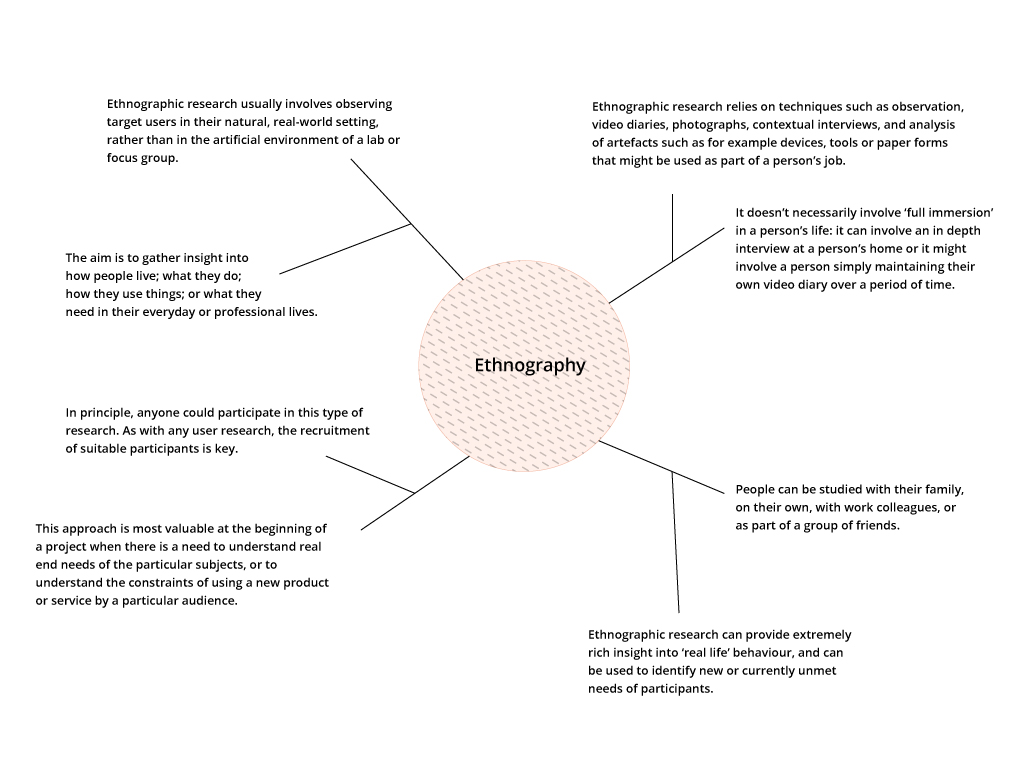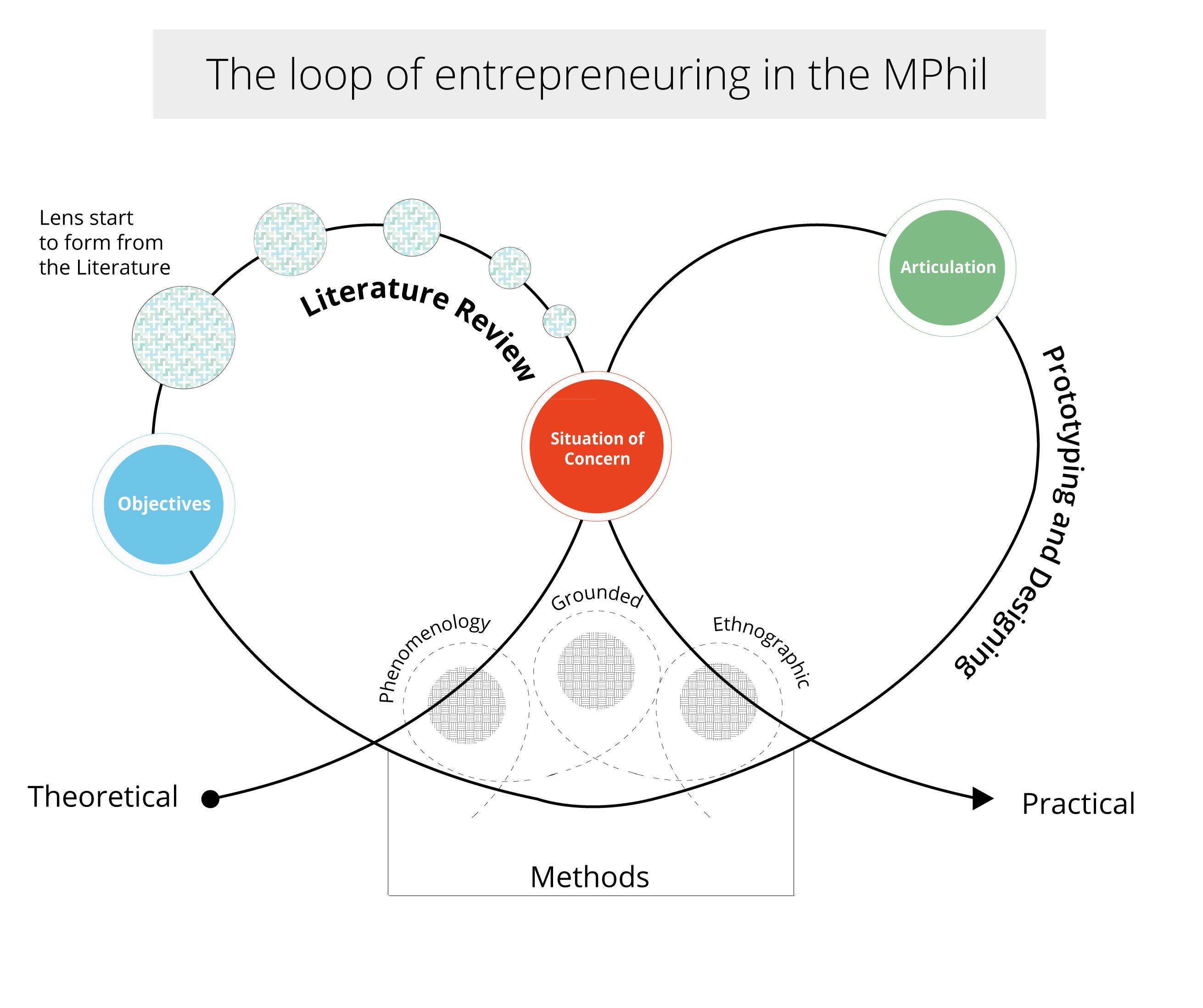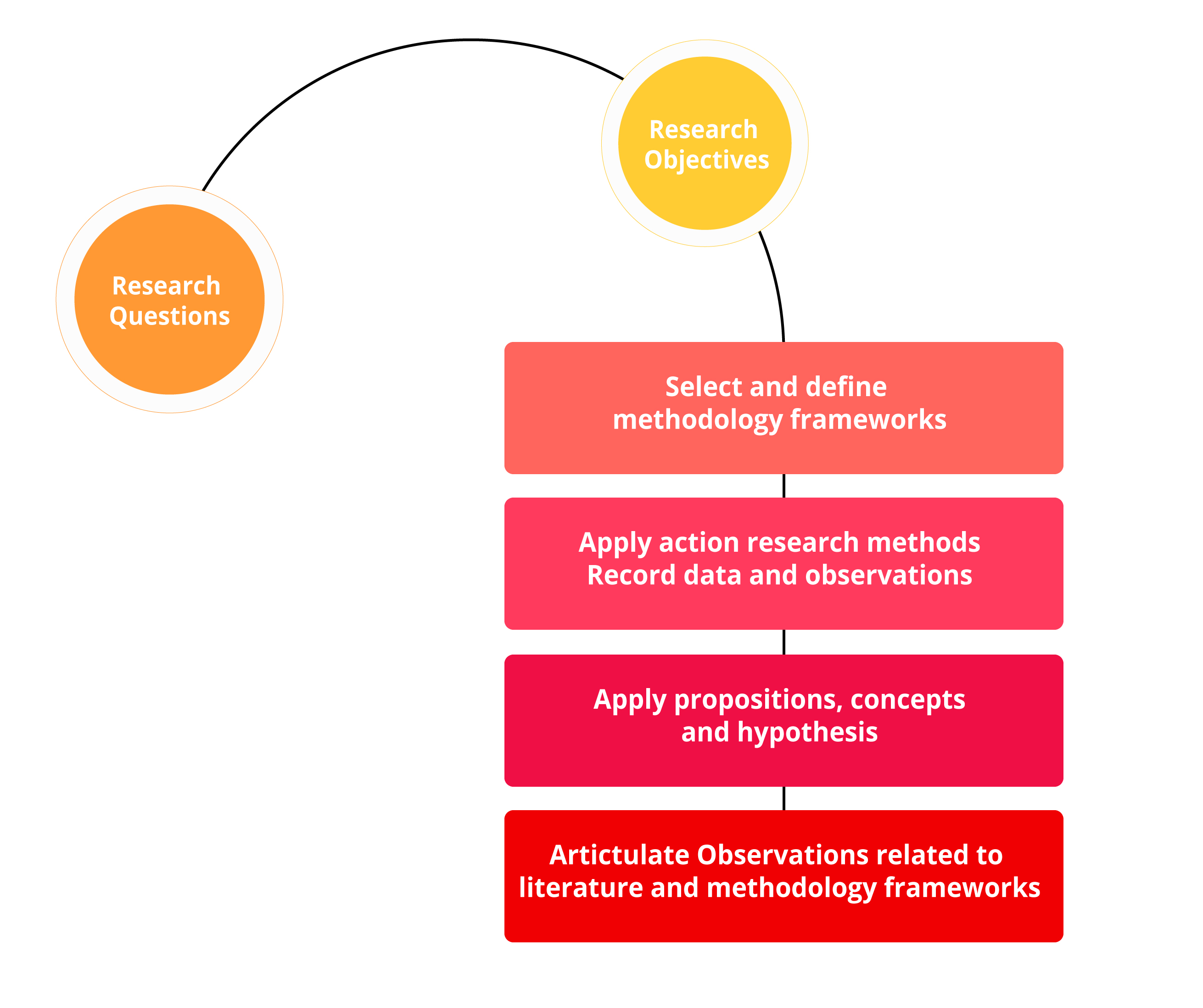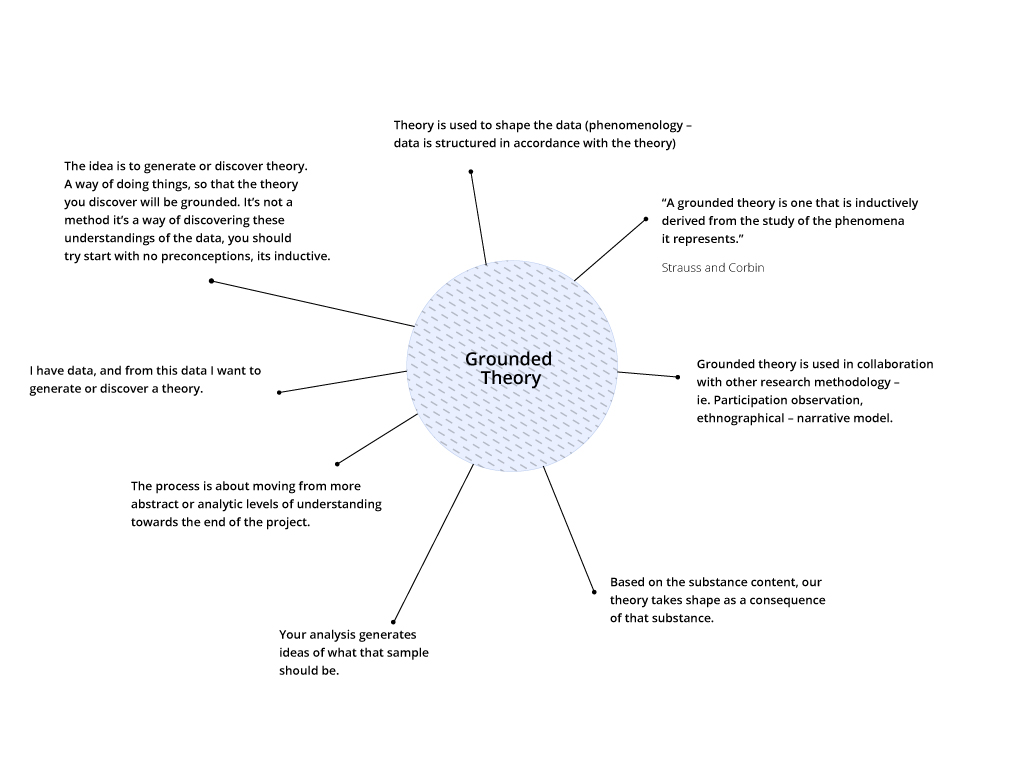The Mphil double loop, getting ready for the research proposal
I have drawn out this diagram in order to comprehend the process of the my masters thesis that I need to embark on. I have named it the loop on entrepreneuring because it is the beginning process to many iterative loops of continuous entreprenuering. I have started at the theoretical loop area, this was the beginning of my journey on the Mphil course, here I was exposed to many different research papers and books, but I didn’t actually know what I wanted to focus on for my research topic.
The central red area, “situation of Concern” is an incredibly crucial element to the process, it defines what you are researching. In my case my problem was situated on designing digital systems for inclusion, rather than designing for exclusion. The major area of concern in the design of technological systems is that they are embedded within a complex world, of multiple ontological narratives. This means that there are multiple ways of approaching the world, multiple ways of knowing and being.It is the role of technology to bridge these multiple narratives, in a synthetic and integrative manner; such that new worlds, new ontologies are born which act as common ground, in the creation of solidarity and shares praxis (practise). Yet, the process in which a designer designs from is built off a set of assumptions, that focus on a stagnant time frame of ones many moments of being. These assumptions don’t take into account the entire being as a set of interlocking perceptions but as one final want.
After defining my research problem area, I started to look at Literature to gain a concept for what academics had researched on the topic and what their perceptions were, this literature started to form different lenses for my understanding of further empirical observations that occurred in daily life. These lens start to form and understanding of where there may be any gaps in the literature appearing. Currently, being at this stage I can find myself taking concepts and ideas and superimposing them on each other, while perceiving this integrative way of calculating, with these new formed lens in place.
These lens are now beginning to form research questions and goals or Objectives at this stage I have found myself constantly getting into a loop of asking myself, what am I trying to do in order to find the right research questions and objectives that I need to start finding.finding. I’ve worked on a diagram, to explain the route of this research so far and what steps I’ll be embarking on.
This diagram, visualizes the research approach I will be embarking on. After writing out my literature review, I have been able to formulate lenses from which I perceive what I need to research or what sort of methodologies I will need to look at, these methodologies are determined by the research questions and research objectives that I work on.
Research Questions
Research questions are important for enabling the researcher to uncover characteristics or behaviors of some phenomena of interest. The questions that the researcher proposes must be actionable, they must state an implicit objective and they must state implicit criteria for evaluation the result.
This section is focused on proving or allowing the researcher to think deeper and more holistically about why their situation of concern needs to be addressed. In the act of thinking up questions it makes you define and narrow down the area of research.The main purpose of research questions is to find out what you need to ask to prove that your problem is important to solve.
These are some of my current research questions:
- How do citizens feel about these e-Centers?
- Are citizens making use of all the potential services the e-Center’s provide?
- How are citizens becoming aware of the e-Centers?
- Do citizens expect certain types of support?
- In which ways are citizens hoping to be enabled?
Research Objectives
The purpose of research objectives is to establish what you want to determine in your research. In my case it will be to determine how to citizens, communities, small businesses and corporate establishments can make use of technologies to publicly crowd source the public sphere. According to Wikipedia a public sphere relates to an area in social life where individuals can come together to freely discuss and identify societal problems, and through that discussion influence political action.
The tangible and practical articulation of this will result in a digital system from which citizens can interact with to post their needs, ideas and issues. The system will be running from Cape Access e-Centers (A Western Cape provincial Government mandate). These centers are mainly to promote digital inclusion. There are 4 main challenges of digital inclusion that these centers thrive to attend to:
- Access – the ability to actually go online and connect to the internet or use these technologies.
- Skills – learning the patterns of a new way of doing things.
- Motivation – understanding why or how these technologies can assist you.
- Trust – not understanding how to go online or moving through a new realm.
Methodologies
I have chosen to work with three different methodologies; Phenomenology, ethnography and Grounded theory.These are qualitative methods which means these methods are relating to, measuring, or measured by the quality of something rather than its quantity.
Phenomenology
Phenomenology is concerned with the study of experience from the perspective of the individual,the taken-for-granted assumptions and usual ways of perceiving what is happening. Epistemology, phenomenological approaches are based in a paradigm of personal knowledge and subjectivity, and emphasize the importance of personal perspective and interpretation. As such they are powerful for understanding subjective experience, gaining insights into people’s motivations and actions, and cutting through the clutter of taken-for-granted assumptions and conventional wisdom.
As a method Phenomenology involves a return to lived experience a listening to the sense and insights that arrive obliquely unbidden or in the midst of life. A methodology that allows a position for philosophical concepts to converge with innate ideas and even critiques that were embedded in my body and surfaced through my performance actions.
Phenomenology provides the dynamics for revealing broader cultural assumptions and practices, for acknowledging the reality that all bodies exist with and through other bodies in social and political contexts, we define ourselves from what we are exposed to. It is a methodology that operates through resonance, rather than an understanding or perspective of “truth”. For example, my experience is not going to be held as truth to be put onto other people, but one persons embodied experience when it is reflected upon, may open up meaning or resonances for people to experience truth.
Phenomenology is a process it can grow with you through your devising process of a performance or an action. It is not in affect just a once off analysis, like an ethnographic questionnaire – if you develop your reflective practices they will offer different material to you as your work develops. Sometimes it will open up questions, sometimes insights, sometimes frustrations, sometimes nothing – like life.
To put this research method into practice, I will be visiting The Paarl e-Centre and immersing myself into the ways in which it is run, I will be observing how citizens work in these centres and what sort of patterns start forming groupings of these patterns. I will be recording these findings with diagrams and video recordings.
Ethnography
Ethnographic research usually involves observing people in their natural, real-world setting, rather than in the artificial environment of a lab or focus group. The aim is to gather insight into how people live; what they do; how they use things; what do the day to day activities consist of; or what they need in their everyday or professional lives.
Ethnographic research relies on techniques such as participant observation, video diaries, photographs, contextual interviews, and analysis of artefacts such as for example devices, tools or paper forms that might be used as part of a person’s job. Ethnographic research can provide extremely rich insight into ‘real life’ behaviour, and can be used to identify new or currently unmet user needs. This approach is most valuable at the beginning of a project when there is a need to understand real end user needs, or to understand the constraints of using a new product or service by a particular audience.
I will be visiting the Paarl east e-Centre once a week for a full day of research. At this time I will spend a few hours observing participants, and running through contextual interviews, I will be be interviewing 5 citizens in a visit. I will be participating in any activities where I can gain insight into how the citizens feel while moving through certain actions.
 Grounded Theory
Grounded Theory
Grounded theory is designed to help social scientists generate theory. It is not hypothesis and problem oriented. Basically, in the research process, you collect some data (do an interview or go out and do some ethnography) then you start analyzing it before you finish your data collection. The idea is to produce new explanations of the data or phenomena you’ve investigated (what your data is about) through the analytic process. With grounded theory you create new ideas as you go through your data, which enables you to develop an understanding of the situation and it will lead you to an understanding of who you need to interview or what your important variables might be.
Grounded theory works at finding what works best in a given situation. It also allows you to see what you might be missing in your data collection or sample – so you expand your sample based on your analysis work – in fact your analysis generates ideas of what that sample should be. Grounded theory’s epistemology is similar to user studies in interaction design, they both rely on inductive analysis of data to generate useful abstractions. It is useful in gaining insight into the social dimensions of designed activity, designed artefacts and designed discipline.
The process is about moving from more abstract or analytic levels of understanding towards the end of the project. Grounded theory is used for theory generation rather than theory verification. Glasser(1992), refers to grounded theory as systemic discovery of theory from data as the concepts emerge and integrate, in other words, I have data, and from this data I want to generate or discover a theory.
Grounded theory is used in collaboration with other research methodology – ie. Participation observation, ethnographical – narrative model. I will be using Grounded theory alongside ethnography and phenomenology to dive deeper into where I need to start looking, what sorts of citizens I need to interview and what I am lacking in my study.




Very nice Irani .